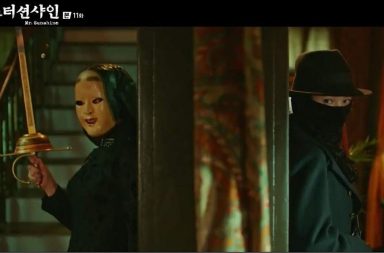 Korean drama productions have long been known for their frantic pace off-screen – the average mini-series drama is practically live-shot and drama-land is rife with stories of actors receiving scripts the day-of, filming all-nighters and falling ill from exhaustion. However, a recent spate of dramas is reversing that trend with entirely pre-produced series debuting to heightened interest and, oftentimes, success.
Korean drama productions have long been known for their frantic pace off-screen – the average mini-series drama is practically live-shot and drama-land is rife with stories of actors receiving scripts the day-of, filming all-nighters and falling ill from exhaustion. However, a recent spate of dramas is reversing that trend with entirely pre-produced series debuting to heightened interest and, oftentimes, success.
Pre-produced dramas are not new to the South Korean drama industry, but they have been few and far between. Typically, South Korean mini-series dramas are 12-24 episodes long and while filming begins in advance, the production (editing, music, etc) often happens week-of broadcast. It’s not unusual that by midway through the broadcast, the filming schedule is a week or few days ahead of broadcast, and production days or hours before broadcast – which is why this is referred to as the “live-shoot” system.
This production model generally is focused around one factor: audience response. Dramas with good ratings are rewarded with extensions which can be easily written in, while lower ratings can mean episode cuts; popular characters can receive more screen time and superfluous characters get written out. Effectively, the live-shoot system gives productions the flexibility to adapt to public feedback. On the flip side, the live-shoot system can be incredibly harsh on the cast and crew. Seoulbeats has covered some of the issues surrounding the live-shoot system before, including the ethical concerns, financial issues, and numerous instances of actors falling ill, getting hurt, or worse.
Pre-produced dramas offer different challenges and advantages. On the plus side, pre-produced shows have time on their side and can adopt a much more leisurely filming schedule. The writing and production quality generally improve given the schedule, and there’s less off-set drama. On the other hand, with the drama entirely, or mostly, filmed before broadcast, shows have less scope to adapt to the audience’s response which affects its commercial viability. As ratings, and commercial success, are often the number one priority, it’s no wonder that the live-shoot system has remained so prevalent.
and advantages. On the plus side, pre-produced shows have time on their side and can adopt a much more leisurely filming schedule. The writing and production quality generally improve given the schedule, and there’s less off-set drama. On the other hand, with the drama entirely, or mostly, filmed before broadcast, shows have less scope to adapt to the audience’s response which affects its commercial viability. As ratings, and commercial success, are often the number one priority, it’s no wonder that the live-shoot system has remained so prevalent.
Historically, productions choose the pre-produced route to accommodate extensive overseas filming or complicated production factors. SBS’s Terroir for example, was filmed in France during the grape harvest season which factored heavily into the wine-focused drama, or Gourmet, also by SBS, which featured elaborate cooking sequences central to the plot. Other times, the PD’s vision for the drama had a movie-like tone – tighter writing, and higher production value – as with MBC’s Friend, Our Legend which was based on the film of the same name and was also helmed by the same PD. Other notable pre-produced shows include sageuk Return of Iljimae on MBC, and tvN’s Basketball, both period dramas. While this list is far from exhaustive, it illustrates just how notable the current rise of pre-produced dramas is.
In the past year alone, there have been multiple entirely or mostly pre-produced shows on both cable and network channels. jTBC’s D-Day kicked off the trend, with the disaster medical drama incorporating large scale special effects to depict an earthquake-torn Seoul. The show averaged more than 1% viewer ratings, significant for a cable drama. Up next was tvN’s college drama Cheese in the Trap, which also boasted high ratings and was a commercial success but fell victim to bad writing and significant off-set drama in the end. Another miss was KBS’s Moorim School which launched with magical multi-cultural ambitions but fell flat with audiences; the show received a four episode cut and would likely have been even shorter if not for the 12 episodes that were already filmed before broadcast.
 Perhaps no other drama has fully exploited the benefits that pre-production has to offer as the currently airing Descendants of the Sun (DotS) on KBS: exotic overseas shooting (check), gorgeously high production value (check), blockbuster-scale special effects (check), movie-star cast (check) and a well written (so far) romance for the ages (check). Not to mention the accompanying promotional machine which has been churning out behind-the-scenes footage, photos, and interviews with the cast non-stop – much easier to do when you’re not scrambling to finish editing and your cast isn’t exhausted by all-night shoots. Cheese in the Trap also featured a similar promotional model, with the cast doing fan appreciation events while the show was still on-air.
Perhaps no other drama has fully exploited the benefits that pre-production has to offer as the currently airing Descendants of the Sun (DotS) on KBS: exotic overseas shooting (check), gorgeously high production value (check), blockbuster-scale special effects (check), movie-star cast (check) and a well written (so far) romance for the ages (check). Not to mention the accompanying promotional machine which has been churning out behind-the-scenes footage, photos, and interviews with the cast non-stop – much easier to do when you’re not scrambling to finish editing and your cast isn’t exhausted by all-night shoots. Cheese in the Trap also featured a similar promotional model, with the cast doing fan appreciation events while the show was still on-air.
DotS is also notable for the production team behind it – specifically writer Kim Eun-sook of Heirs, Secret Garden and A Gentleman’s Dignity fame, as well as the production company behind many of those same dramas – and so for that reason DotS’s success could have a much greater impact on the industry. With such a high profile writer, production company and network buying in to this model and being handsomely rewarded for it – through episode 8, ratings are near 30% and growing in South Korea with hundreds of millions more views in China, the show is already turning a profit despite insane production costs, and was reportedly sold in Japan for a record price – it’s likely that more productions will take note of their success and follow their lead.
There’s already a full slate of pre-produced dramas expected to air in 2016. KBS will hope to follow the success of DotS with Uncontrollably Fond starring Kim Woo-bin and Suzy, which set to air in June. SBS’s upcoming star-studded sageuk fusion Scarlet Heart: Ryeo is planning to broadcast concurrently in South Korea and China later this year. Crime procedural Police Unit 38 on OCN will feature an all-star lineup of Ma Dong-suk, Seo In-guk and SNSD’s Sooyoung. And in what will likely be his final drama before enlisting in the military, Jung Il-woo is set to headline Cinderella and the Four Knights, which is currently in production but without a broadcast partner.

What do you think readers? Is this trend of pre-produced dramas here to stay or just a passing fad? Are there any other benefits or disadvantages to pre-production?
(Sources: Dramabeans, Yonhap, Facebook, Nate, Images via: KBS, SBS, Blossom Ent, WM Company)


